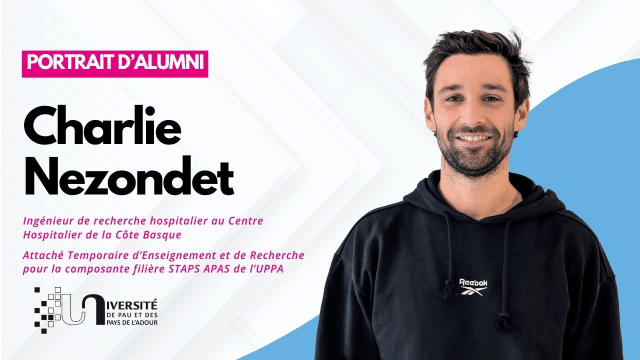Charlie Nezondet, hospital research engineer at the Centre Hospitalier de la Côte Basque and ATER for the STAPS APAS component of UPPA (Anglet)
After a professional course in sports coaching and dietetics, the young man from Biarritz went on to study at the STAPS in Rennes, followed by a master's degree in Adapted Physical Activity and Health (APAS). In 2020, the CHCB* recruited him as a teacher of adapted physical activity (APA) and, a few months later, offered him the chance to do a thesis funded by the UPPA's STAPS programme. He accepted the challenge.
You have an atypical curriculum. How did you make your choices?
My first choice, to do a BPJEPS (Brevet Professionnel de la Jeunesse, de l'Éducation Populaire et du Sport) was guided by the desire to stay where I had done all my schooling. I was accepted at the Académie Basque du Sport in Biarritz to take this sandwich course. What interested me was physical activity for all, and its impact on health, getting back to physical activity through coaching... Then, in 2015, I enrolled for a BTS in Dietetics in Bordeaux to better understand the link between physical activity and nutrition at all stages of life. I did several placements at the CHCB and in rehabilitation centres in the region. And at the end of my BTS, I discovered the Adapted Physical Activity and Health (APAS) speciality offered by STAPS. I applied to around thirty universities to join this course in L3, which led me to Rennes for a year. Then I went to Nice for an APAS Masters.
Are you starting to work with your APAS Masters?
Yes! The CHCB wanted to take me on as an APA teacher, a job that involves working with patients of all ages - in partnership with doctors, psychologists and physiotherapists - to improve their health through adapted sports activities.
What prompted you to do a thesis?
An alignment of the planets! In 2019, UPPA created the APAS speciality within the STAPS course. A few months later, Gautier Zunquin, head of the STAPS APAS degree (Anglet), contacted the CHCB to offer to fund a thesis on a hospital project. I took a fortnight to think about it and accepted. The Capacité 64 project proposed by the CHCB concerned the development of physical literacy support for overweight and obese teenagers, i.e. taking into account physical, social and psychological skills and motivation for lifelong active behaviour. A global approach, inspired by Canada, in line with my degree and my first steps in the profession. I signed a three-year contract with UPPA (2020-2023), hosted by STAPS Anglet. I defended my thesis in November 2023, the first research project to be carried out jointly by UPPA and the CHCB.
How do you view UPPA?
A very positive view! UPPA is a university that is both big for a small university and small for a big university! Particularly at the Anglet site, where you get the feeling that you're part of a caring team, from the secretariat to the IT department and the teaching staff. There's a very close relationship between students and lecturers.
During my thesis, I went over to the other side of the fence, as I also started teaching in L1, L2 and L3. It's an experience that I'm continuing today, as I devote 50% of my time to teaching and 50% to my job as a hospital research engineer.
Two or three words that you spontaneously associate with UPPA?
Innovation - Dynamism - Well-being.
Any advice for UPPA students at the start of their STAPS course?
I'd like to warn them about choosing STAPS, which is too often associated simply with a passion for sport. You don't do STAPS to practise sport, but to get others to practise it. The advice I would give them is to think very early on about where they want to live after their studies, to work on their network and do work placements in the region where they want to settle down. It's important that the contacts they make during their studies make it easier for them to find a job at the end of their course. Lastly, I'd like to reassure those who go into a vocational stream after the baccalauréat that there's nothing to stop them returning to the university stream a few years later. And I'm a good example of that!
*CHCB = Basque Coast Hospital Centre
Find out more ?
Interview by Florence Elman.

Comments0
Please log in to see or add a comment
Suggested Articles


